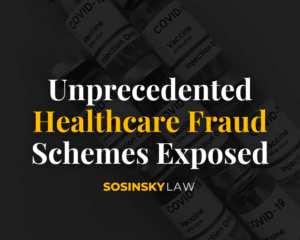Federal Insider Trading Lawyer
Federal Insider Trading Charges
Few phrases strike as much fear in the hearts of company founders, executives, and insiders as “insider trading”. This serious matter can have significant ramifications, especially if allegations become public. If proven, civil or criminal penalties may be imposed.
While high-profile cases like the Martha Stewart and Enron scandals have brought insider trading to public attention, it’s important to note that the U.S. Department of Justice (DOJ), Federal Bureau of Investigation (FBI), and Securities and Exchange Commission (SEC) investigate numerous insider trading cases that often go unnoticed. In fact, insider trading investigations are quite common, resulting in prosecutions, substantial fines, and federal imprisonment for those involved. If you’re facing federal insider trading charges, do not delay. Contact Sosinsky Law at (212) 285-2270 for a free consultation and to learn more about how we can help.
Understanding The Different Types Of Investment Fraud
Federal investment fraud encompasses various types of illegal activities, including insider trading and stock manipulation. However, it extends beyond these examples to encompass a wide array of other crimes. Some of these offenses may include the following:
- Pyramid and ponzi schemes where there are promises to investors of large profits for recruitment of new investors;
- Pump and dump schemes where false information is spread regarding a stock to increase price and then a quick sell for profit;
- Insider trading where trades are made on a company stock based on information that is not publicly available;
- Churning is when a broker with control of an investor’s account makes excessive stock transactions to obtain commissions;
- Embezzlement and accounting fraud;
- Real estate and estate planning fraud;
- Telemarketing and timeshare fraud;
Individuals engaged in investment fraud often find themselves involved in other types of white-collar federal crimes. These crimes include identity theft, forgery, bribery, extortion, and the falsification of business records.
Relevant Federal Laws Applying To Insider Trading
The investment industry is subject to a comprehensive set of federal regulations, with the Securities and Exchange Commission (SEC) responsible for enforcing securities laws. In cases of investment fraud, federal prosecutors depend on the following acts as vital instruments:
- Securities Exchange Act of 1934;
- Trust Indenture Act of 1939;
- Investment Company Act of 1940;
- Securities Act of 1993;
- Sarbanes-Oxley Act of 2002;
- Dodd-Frank Wall Street Reform and Consumer Protection Act of 2010;
- Jumpstart Our Business Startups Act of 2012
Various sources typically identify and report investment fraud, such as federal regulatory agencies, whistleblowers, and investors.
Federal Penalties For Insider Trading
Investment fraud is typically prosecuted under U.S.C. § 1348 by the Securities and Exchange Commission (SEC). If found guilty, you may face the following penalties:
- Five years in prison for each offense;
- Fines will be decided by circumstances and type of fraud, but normally range from $10,000 to much higher;
- Restitution will typically be ordered by the court due to the fact defendant’s actions caused a monetary loss to a person or company;
- Probation could be ordered by the court if there was only a single act of fraud and not financial loss, which normally lasts 5 years and includes specific conditions, such as payment of fines and restitution, and other conditions.
It is important to understand that additional charges, such as obstruction of justice, have the potential to amplify the penalties associated with being convicted of investment fraud.

New York State’s Insider Trading Law
The Martin Act of 1921 gives the New York Attorney General (AG) extraordinary leeway without the same burden of proof as federal prosecutors. The Martin Act, widely regarded as the most stringent securities fraud law in the nation, grants the Attorney General sweeping powers to investigate, subpoena, arrest, and charge individuals based solely on suspicions of false promises or alleged fraudulent behavior. Unlike other legal frameworks, the Martin Act does not require proof of intent to defraud or evidence of a fraudulent sale or transaction.
Furthermore, the Act’s provisions are not subject to judicial review. Consequently, numerous individuals have been arrested and convicted solely on the basis of the Attorney General’s suspicion of false promises, even in the absence of any evidence of fraudulent transactions.
New York State’s Penalties For Insider Trading
Under the Martin Act, the A.G. may seek misdemeanor and felony charges:
- Fines of $3,000 for each injunction violation – civil misdemeanor
- Fine up to $500 and one year in prison for criminal misdemeanor
- Imprisonment of up to four years for felony criminal charges
Power To Investigate Securities And Real Estate Offerings
The AG has the authority to launch a public or confidential investigation into:
- Any sale, offer, or purchase of securities and commodities within or from New York
- Any sale, offer, or purchase of real estate involving condominiums and cooperative apartments within or from New York
New York State may:
- Commence civil proceedings for restitution or injunctive relief
- Issue statewide subpoenas to secure documentation and testimony
- Grant witness immunity
Facing insider trading charges in New York can result in significant personal, professional, and financial losses, even without a conviction. That’s why it’s crucial for individuals to seek representation from a knowledgeable NYC criminal lawyer well-versed in federal and state laws.
Potential Defenses To Investment Fraud Charges
The defense strategy for an investment fraud accusation should be tailored to the specific facts of your case. There are several potential defenses to consider:
- That you did not commit fraud as presented by the prosecution;
- That you were never deceptive in your interactions with clients;
- That your actions were not reckless or intentional;
- That evidence or testimony has been misrepresented;
- That investor did not rely on the information you provided;
- That you are innocent of investment advisory fraud for any other reason;
To secure a conviction for investment fraud, the prosecution must present concrete evidence of your involvement in fraudulent activities. Additionally, they need to demonstrate that an investor made a detrimental financial decision based on the false information you provided.
In essence, the federal prosecutor is tasked with proving multiple crucial elements beyond a reasonable doubt to obtain a conviction. In simpler terms, every aspect of the crime must be established for a successful prosecution.
Who Can Be Found Guilty of Insider Trading?
The scope of the term “insider” in relation to insider trading extends far beyond common perception. While it encompasses corporate officers and directors, it also includes employees at lower levels, as well as friends, family members, and other individuals outside the organization who have access to significant nonpublic information. As a result, the DOJ, FBI, and SEC have the authority to pursue insider trading cases against a wide range of individuals, including:
- Company founders
- Company officers and directors
- Company employees
- Business associates of company founders and personnel
- Friends and family members of company founders and personnel
- Employees of law firms, consulting firms, brokerage firms, and other professional services firms
- Employees of printing companies and other vendors that have access to material, nonpublic information
- Government employees who have access to material, nonpublic information (through their employment or otherwise)
- Individuals who receive tips or misappropriate material, nonpublic information
Contact Our Federal Insider Trading Lawyer Now
When contacted by the SEC or the Attorney General’s office, it is crucial to promptly engage the services of a federal insider trading lawyer to represent you. Early intervention is vital to safeguard against any potential exploitation by the government while demonstrating your willingness to cooperate.
An experienced insider trading attorney will prioritize the protection of your freedom, assets, and future. At Sosinsky Law, we possess extensive expertise in insider trading laws and a proven track record in handling cases like yours. We are prepared to zealously advocate for you at both the state and federal levels, countering any actions taken against you and striving for a favorable resolution. Contact our office now for a free consultation and to learn more about how we can help.
SOS? CONTACT SOSINSKY
NYC Criminal Defense

Unprecedented Healthcare Fraud Schemes Exposed
Unprecedented Healthcare Fraud Schemes Exposed: A Glimpse into the Recent DOJ Crackdown In a groundbreaking move, the Department of Justice has unveiled criminal charges against
